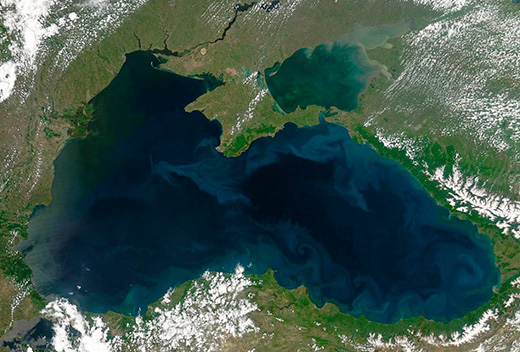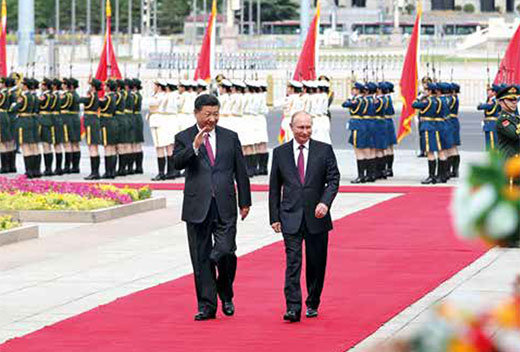
A Transitional Arrangement for Karabakh May Be Necessary  By Benyamin POGHOSYAN, PhD, Chairman, Center for Political and Economic Strategic Studies
By Benyamin POGHOSYAN, PhD, Chairman, Center for Political and Economic Strategic Studies
The issue of the status of Nagorno Karabakh cannot be avoided in future discussions on an Armenia-Azerbaijan bilateral peace treaty. One solution is to agree to some transitional arrangement.
The April 6 Brussels meeting between Armenian Prime Minister Nikol Pashinyan and Azerbaijani President Ilham Aliyev gave the Armenia – Azerbaijan negotiations new momentum. The sides agreed to establish a border delimitation and demarcation commission and take steps to launch negotiations over the signature of a bilateral peace treaty. These issues were also agreed upon in principle back in November 2021, when two leaders had a meeting in Sochi facilitated by Russian President Vladimir Putin. READ MORE
- EGF Editor |
Published on EGF: 20.05.2022
| Security
-
Lack of Results in Armenia-Azerbaijan Talks Can Quickly Lead to Renewed Violence
 By Fuad SHAHBAZOV, Baku-based independent regional security and defence analyst
By Fuad SHAHBAZOV, Baku-based independent regional security and defence analyst
On May 12, the Foreign Ministers of Azerbaijan and Armenia held another meeting in Dushanbe, Tajikistan, on the side-lines of the Russia-led Commonwealth of Independent States Ministerial summit, and with the participation of the Russian foreign minister. Although Armenian Foreign Minister Ararat Mirzoyan characterized the meeting as another “productive interaction” between the warring parties, little progress has been made in the peace negotiations between Baku and Yerevan since the 6 April meeting of the leaders of the two countries in Brussels. READ MORE
- EGF Editor |
Published on EGF: 20.05.2022
| Security
-
Black Sea Security in Times of War  By Eugene KOGAN, Tbilisi-based defence and security expert
By Eugene KOGAN, Tbilisi-based defence and security expert
There is no doubt that the ongoing Russian military action against Ukraine profoundly affects the rest of the Black Sea littoral states: Bulgaria, Georgia, Romania and Turkey. The tense standoff of recent weeks placed each of them in a difficult position between apprehension and, particularly with Turkey, a kind of peacemaker or rather mediator, which Russia now ignores completely.
Romanian Defence Minister, Vasile Dincu, said in January 2022 that “Russia, at the moment, is not a direct threat to Romania, but it is [rather] a threat to security in the [Black Sea] area”. The author disagrees with the minister’s statement since the Russian military, which is stationed on the occupied Crimean peninsula - not much more than 100 km from the Danube Delta – is a direct threat to Romania, even though Russian officials will blame the other side for posing a threat to Russia. Furthermore, the region’s three NATO member countries, namely Bulgaria, Romania and Turkey, have until today been unable to create and implement a comprehensive Black Sea security strategy together with NATO aspirants Georgia and Ukraine to counter the challenges posed by Russia. The latter, however, successfully implemented its divide and rule policy in the region. READ MORE.
- EGF Editor |
Published on EGF: 21.04.2022
| Security
-
Iran and the Second Karabakh War: Assessing the New Balance of Power in the South Caucasus
 By Fuad SHAHBAZOV, Baku-based independent regional security and defence analyst
By Fuad SHAHBAZOV, Baku-based independent regional security and defence analyst
The second Karabakh war between Azerbaijan and Armenia in September of 2020 opened a new page in the modern history of the post-Soviet region and explicitly changed the geopolitical landscape in the South Caucasus. With Baku regaining control over large swathes of territories, Turkey has obtained a greater role in the region, acting as a guarantor of the ceasefire regime between Azerbaijan-Armenia alongside Russia, whereas Iran’s diminished position has gotten less attention. Indeed, in the post-war period, Tehran saw a steep decline in its regional influence in the Southern Caucasus, losing its direct land route to Armenia and facing the growing influence of Russia, Israel, and Turkey. Prior to the conflict, Iran had long pursued a balanced foreign policy in the region, developing a partnership with Armenia and Azerbaijan, respectively. However, Turkey’s close relations with Azerbaijan since the 1990s prevented Iran from establishing powerful leverage over this country, unlike landlocked Armenia, which has relied on Iran as one of the main economic partners. READ MORE
- EGF Editor |
Published on EGF: 13.04.2022
| Security
-
What is Next in Ukraine  By Benyamin POGHOSYAN, PhD, Chairman, Center for Political and Economic Strategic Studies
By Benyamin POGHOSYAN, PhD, Chairman, Center for Political and Economic Strategic Studies
As large-scale hostilities continue in Ukraine, politicians, geopolitical experts and international media outlets seek to assess the outcomes and implications of the conflict. When Russia launched its “special military operation” on February 24, the widespread assumption was that Russia planned a blitzkrieg to take major Ukrainian cities within days or maximum weeks. The narrative changed as the first week of hostilities passed with no significant Russian successes. Experts and commentators started to claim that the Russian plan failed due to miscalculations and stiff resistance of the Ukrainians. According to these assessments, Russian President Vladimir Putin was misinformed by his advisors and generals, who promised him that many Ukrainians would meet Russian troops with flowers and that the “special military operation” would be an “easy evening walk.” According to this narrative, facing a different reality, at the beginning of March 2022, Putin started to look for ways out of the mess hastily and end the war. READ MORE
- EGF Editor |
Published on EGF: 31.03.2022
| Security
-
Why non-aligned Azerbaijan signed an alliance declaration with Russia
 By Fuad SHAHBAZOV, Baku-based independent regional security and defence analyst
By Fuad SHAHBAZOV, Baku-based independent regional security and defence analyst
On February 22, the President of Azerbaijan Ilham Aliyev made an paid official trip visit to Moscow to discuss and sign a new declaration on allied cooperation with Russia. The visit came just a day after President Putin's infamous decision to recognize the independence of the so-called Donetsk People's Republic and Luhansk Peoples' Republic in Eastern Ukraine. President Vladimir Putin’s “unexpected” decision deteriorated relations with Ukraine, even more and was followed by the new round of economic sanctions imposed by the U.S and the EU.
President Aliyev's visit to Moscow triggered debates in Azerbaijan and Russia, respectively , on whether the main text of the declaration was pre-negotiated between the two leaders, or prepared amid the escalation around Ukraine. READ MORE
- EGF Editor |
Published on EGF: 28.02.2022
| Security
-
Russia-China-Afghanistan  By Eugene KOGAN, Tbilisi-based defence and security expert
By Eugene KOGAN, Tbilisi-based defence and security expert
Moscow and Beijing are likely to discover that their initial joy over the US withdrawal from Afghanistan may be premature. Afghanistan under the Taliban remains divided, insecure and uncertain about its current and future path. Without stability and security, neither Beijing nor Moscow will provide economic assistance while the international community will continue to shun Afghanistan.
Russia’s Presidential Envoy to Afghanistan, Zamir Kabulov, noted that “The Taliban were easier to negotiate with than the old “puppet government” of the exiled President Ashraf Ghani.” The latter was seen by, and from Moscow, as a puppet of the West and contacts that Russia maintained with Hamid Karzai’s successor were either downgraded or revised. At the same time, contacts between Russia and the Taliban only increased. With the West’s departure, Moscow is seizing up the opportunity indirectly to recognise the authority of the Taliban, which it officially designated as a terrorist organisation back in 2003 though without burning its bridges with the militant group. READ MORE.
- EGF Editor |
Published on EGF: 22.02.2022
| Security
-
Assessing the Urban Terrorism Strategy of the Kurdistan Workers' Party in Turkey
 By Fuad SHAHBAZOV, Baku-based independent regional security and defence analyst
By Fuad SHAHBAZOV, Baku-based independent regional security and defence analyst
Since its emergence in the 1980s, the Kurdistan Workers' Party (PKK) has been a significant source of concern to the state of Turkey. With the escalation of conflict between the Turkish state and the ethnic Kurdish community in the 1990s, the level of violence explicitly increased, and the civilian death toll rose to its highest point. Though the PKK could not ensure absolute authority in large, predominantly Kurdish provinces in the southeast, it gradually shifted to a new strategy —urban violence— to undermine the Turkish state's authority in Kurdish regions.
According to theories of violent resistance, violence is the only practical and productive tool of mass mobilisation of ethnic insurgencies against political systems. In the case of Kurdish nationalism in Turkey, many scholars argue that Turkey's policy of ethnic nationalism has had a decisive role in shaping Kurdish ethnic nationalism throughout these years. READ MORE
- EGF Editor |
Published on EGF: 22.02.2022
| Security
-
War and Peace in the South Caucasus: Putin Style  By Alan Whitehorn, Professor Emeritus in Political Science, The Royal Military College of Canada
By Alan Whitehorn, Professor Emeritus in Political Science, The Royal Military College of Canada
Without a doubt, Russia’s leader Vladimir Putin is the greatest factor in the risk of war between Russia and Ukraine. Yet paradoxically, Putin is perhaps the best hope for peace in the South Caucasus, at least as far as Azerbaijan and Armenia are concerned. The Georgian situation is, however, another matter. But one should take one step at a time in this exceptionally dangerous and conflict-prone region.
The recent 2020 Karabakh War between Azerbaijan and Armenia was, in effect, a continuation of the bitter 1990s ethno-religious territorial war over Nagorno-Karabakh (Artsakh) that emerged between the two newly independent states in the midst of the break-up of the Soviet Union. The 1990s conflict produced thousands of casualties and hundreds of thousands of displaced civilian ethnic minority refugees. It was a humanitarian catastrophe for families on both sides of the border. READ MORE
- EGF Editor |
Published on EGF: 16.01.2022
| Security
-
Will Turkey Gamble with Ukraine against Russia?  By Yeghia TASHJIAN, Beirut-based regional analyst and researcher, columnist, "The Armenian Weekly”
By Yeghia TASHJIAN, Beirut-based regional analyst and researcher, columnist, "The Armenian Weekly”
In the past few years, Turkey has been gradually increasing its influence in Ukraine through trade and military cooperation amid escalating tensions between Moscow and Kyiv, challenging Moscow’s standing in the Black Sea region. The strategic cooperation between Ankara and Kyiv is not limited to political statements, but rather encompasses other important fields, such as the economy, security and defence industries. Moreover, relations between the two countries gained further impetus with Russia’s unification of Crimea in 2014 and reached their peak during the administration of Ukrainian President Volodymyr Zelensky, who assumed office in 2019. READ MORE
- EGF Editor |
Published on EGF: 18.12.2021
| Security
-
